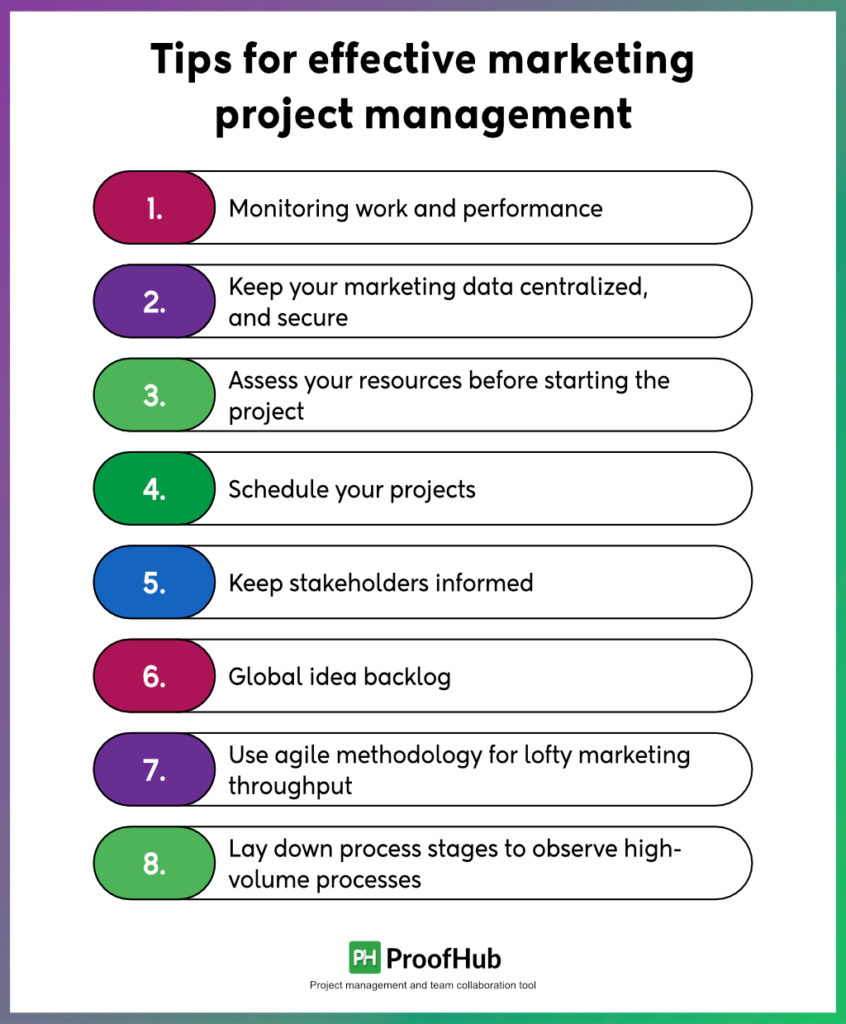In today’s fast-paced business environment, effective marketing project management is crucial for the success of any campaign. Managing several projects, tight deadlines, and multiple teams can be difficult, but with the correct marketing project management tips and strategies you can streamline procedures and meet your marketing objectives more efficiently.
This article provides useful tips that help you finish your projects on time and with maximum impact.
Whether you’re an experienced marketer or new to the profession, these tips will help you deal with the complexities of marketing project management and drive better results for your organization.
What is marketing project management?
Marketing project management is the process of planning, executing, and overseeing marketing projects to ensure they are completed successfully. It involves setting clear objectives, defining project scopes, allocating resources, coordinating tasks, managing timelines, and measuring outcomes.
It ensures that all marketing activities, from campaigns to product launches, are organized efficiently and align with the strategic goals of the organization. Effective marketing project management facilitates seamless collaboration among team members and stakeholders, helping to deliver projects on time, within budget, and with the desired impact.
What are the tips for effective marketing project management?
Though marketing project management undoubtedly benefits businesses in more ways than one, most marketing managers prefer to dedicate most of their time to marketing rather than managing day-to-day management aspects.
However, things are quite different in the real world. Marketing projects can be done in various forms, like publishing blog posts global product releases, and collateral production. Marketing project managers have to handle them all effectively to yield the desired results. They even need to use the latest team collaboration and marketing project management tools to organize and streamline things.
This article lists some proven marketing project management tips that can help you get the job done without getting overwhelmed by core management activities.

1. Monitoring work and performance
These days, marketing has become a numbers game. Every organization’s marketing efforts are measured in numbers. Therefore, it becomes vital to associate marketing work with monitoring performances, when and where possible.
Revenue and brand awareness are direct results of various brand interactions. The results of marketing campaigns are sometimes visible whereas at other times they are not. You should be able to improve your marketing campaigns when you can evaluate the leads and revenue that your strategy generates. Hence focus on evaluating your marketing efforts. There are a number of tools that can help you in this regard.
2. Keep your marketing data centralized, and secure
Most marketing teams operate on multiple shared drives, Dropbox, and Google Drive accounts. Rather, they should be storing all marketing assets in a centralized location and use a digital asset management system for this purpose. Also known as DAM software, these storage systems can help teams work swiftly by quickly finding the files they need. Improved and efficient systems can even:
- Tag images automatically
- Convert images and video files into different formats
- Manage different versions
Marketing professionals in some of the world’s largest companies are looking forward to storing and organizing all digital assets in a single platform to prevent content duplication. Integrated marketing operations software can offer useful features like brand and creative project management.
3. Assess your resources before starting the project
Before you get started with your marketing project, it’s important to understand how you’ll be able to achieve your objectives. You’ll have to take into consideration crucial factors such as talent, tools, and budget into account. If you do not have adequate resources then how will you be able to execute your projects?
Cutting down on the best projects just because you don’t have the required resources can prove to be a big mistake. It’s ideal for marketing project managers to plan optimal project management requirements first and then consider the available resources to make your project a reality. Include the names of all those who’ll be a part of the project, the tools you’d need to do it, and the anticipated budget.
4. Schedule your projects
Your project schedule dictates what tasks need to be done when, by whom, with their start and end dates. You can make a good project schedule by asking yourself 5 W’s that are:
- Who (will do it?)
- What (resources are required to make it happen?)
- Where (which teams in which departments will be involved to make it happen?)
- When (what is the timeline for projects and tasks)
- Why (what is the main goal of the project?)
Creating and managing a good project schedule takes calculation, strategy, time, and collaboration. Always review the timeline with your team members and stakeholders at each milestone. Determine and manage your task dependencies to minimize risk and ensure each task can be completed successfully with minimum roadblocks.
5. Keep stakeholders informed
As much as 50% of marketing takes place outside the marketing department in many businesses. Sales representatives have the responsibility to convert leads into sales, and engineers are tasked to design products to satisfy the customers’ requirements. Support representatives to create and build brand loyalty.
As a consequence, marketers cannot perform their jobs without a comprehensive collaboration throughout the company. Promote and smoothen collaboration with marketing stakeholders by publishing marketing plans and results at regular intervals. It’s essential to build buy-in upfront to motivate stakeholders to work with the marketing department to produce better results.
6. Global idea backlog
Innovation is requisite to great marketing, but you can’t hurry creativity. Just because you need a unique, progressive campaign idea doesn’t guarantee that you will have it. On the other hand, regular marketing ideas routinely fall by the wayside due to the reason that on any given day most marketing managers usually have more work to do than what they’re capable of.
It’s always a good idea to keep a global backlog of marketing ideas, so that you keep track of the good ideas, and always working on the best ideas. Additionally, you can foster the creative power of your entire organization by motivating people outside of the marketing domain to give to the marketing idea backlog.
A well-described product strategy is a way to realize your vision. You can complement the backlog with a roadmap to sketch an all-inclusive way you want to take your product on.
7. Use agile methodology for lofty marketing throughput
Agile methodology is one of the latest marketing management approaches that are increasingly used by businesses across the globe for breaking projects into several stages and involving consistent collaboration with stakeholders as well as continuous improvement and iteration at every stage.
When applied correctly, agile methodology can dramatically increase marketing output, cut down project delays, and enable continuous improvement. Agile marketing is a powerful tool, but it has to be used properly, or else your agile team will constantly get bogged down in delays and bottlenecks.
8. Lay down process stages to observe high-volume processes
The higher volume of marketing projects leads to marketing project management becoming marketing process management. Whether it’s content creation, creative services, media production, or online campaign execution, all of these scale into continuous & regular marketing process workflows as the marketing department propagates.
After standardizing the handoffs and deliverables for these workflows, it is not necessary to track every individual task. Define clear process stages and monitor the flow of work by stage instead of tasks. Stage management allows you to detect bottlenecks, develop performance benchmarks, and balance workloads.
How ProofHub help in marketing project management?
Project managers need to stay in control of both projects and teams, and ProofHub gives them the right tools to do it. Here’s how project managers enjoy greater control without taking stress.
- Say goodbye to confusion with ProofHub; it shows you a clear agenda for the day. You know what you are supposed to do at work, every morning.
You can create your to-do lists, set recurring tasks and events, set automatic reminders, plan tasks, and schedules, and do other work for the day with the help of task management software and a scheduling calendar. - Kanban boards in ProofHub let you create your workflow with clearly defined stages. Teams have a clear understanding of how they need to proceed with their work
- Gantt chart software makes it easy for project managers to easily plan projects, modify schedules, and visualize tasks in a timeline view. You get a clear picture of everything and make better decisions to avoid bottlenecks, manage resources efficiently, and do a lot more.
- ProofHub helps project managers and teams stay productive and accountable by providing an accurate record of how, where, and how much time they are spending on tasks. They can better manage your time and deliver projects within deadlines.
- ProofHub streamlines the feedback-sharing process by letting teams clear feedback on files through an online proofing tool. Collaborate on designs and documents in real-time, use markup tools to annotate files, review, and add comments to share feedback in one place.
- ProofHub mobile app gives you the flexibility to manage projects, teams, and clients from any place. You can manage teams, make decisions, and approve work even when you are on the go.
- ProofHub helps make internal communication within an organization quicker with individual or group chats and discussions.
Conclusion
Are you ready to become an effective and result-oriented marketing project manager? I’m sure you are. You have to leverage the latest technologies to survive in today’s ultra-competitive market scenario.
Use ProofHub to simplify even the most complex projects and improve team collaboration through powerful features in one centralized location. Get started with a FREE trial, and then upgrade to a more powerful Ultimate Control plan priced reasonably at just $89 per month, billed annually.
Related articles
- Marketing workflow management: Your complete guide for 2026
- 10 Must-have skills marketing project managers should possess (to deliver projects successfully)
- A manager’s guide to marketing resource management 2026
- 30 Best marketing project management tools to use in 2026
FAQs
What is project management in marketing?
Project management involves planning, creating, executing, and completing certain tasks and goals to deliver a project successfully.
How do you organize a marketing project?
Organize your marketing project by choosing the highest priority project, explain its background with a creative brief, and defining the project’s requirements.

